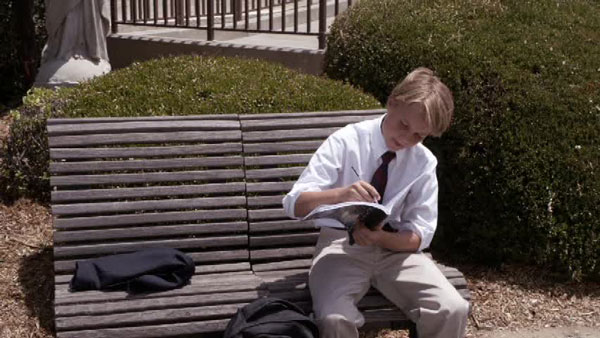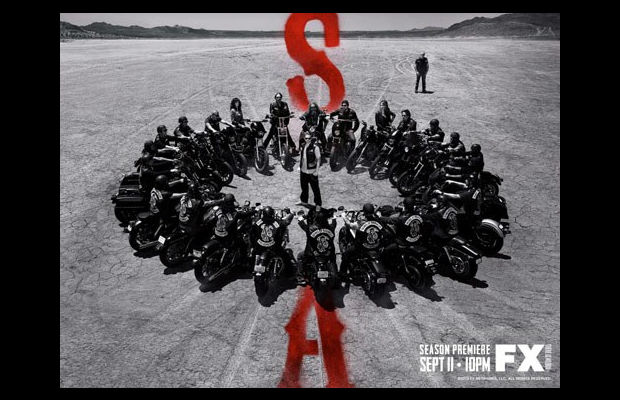 |
| Sons of Anarchy |
In 15th and early 16th century Europe, morality plays existed to entertain audiences, but also to teach them lessons. Classic morality plays used allegory to impart lessons about what it means to be good, and what it means to be evil. Typically, virtue always prevailed over vice.
Shakespeare no doubt was exposed to such plays in his early life, and reflections of this genre can be seen (in more complex forms) in some of his plays, including Hamlet. Showrunner Kurt Sutter has said Hamlet inspired Sons of Anarchy, which began its sixth season on Tuesday, Sept. 10.
At a recent press conference, Sutter acknowledged the shocking ending of the season premier, which follows a young boy who takes a KG-9 machine gun into a school and opens fire (the audience hears the shots and screams from inside the building). Sutter said,
“It is truly the catalyst for the third act of our morality play. It sets everything in motion for this season that will ultimately lead to the end that then will bring us into the final season and what I see as the ultimate comeuppance of everything in terms of the series.”
Viewers were shocked at the scene, and a conservative parents group is calling for Congress to reconsider cable programming distribution methods because of, in part, this episode.
In an article at The Daily Beast, Jason Lynch (who has screened the first three episodes) asserts that the show has gone too far, and that this storyline is “damaging to the series and its characters.”
What is clear at the end of the first episode is that SAMCRO has some connection to the gun and to the child shooter. The child is the son of a woman who is dating Nero’s cousin, and we can assume that the gun used in the shooting came from the Sons, who run guns and produce pornography.
While this episode is horrifyingly violent and disturbing, it’s also this: brilliant.
If we think about Sutter’s influences–Hamlet and his reference to Sons of Anarchy being a “morality play”–something needs to happen this season. That something that needs to happen is that we need to start despising the club, and maybe even Jax (unless he is “reformed” into virtue, as the protagonist of a true morality play would be).
 |
| The child shooter–the juxtaposition of virtue (religion, order) and vice (guns, violence), and a case study in toxic masculinity. |
At this point (in the action of this first episode), the men of SAMCRO are still operating in some sphere of justice and morality. This is highlighted in the opening women-in-refrigerators plot point when the men avenge the beating and rape of Lyla, who had gotten a job shooting porn that turned out to be violent torture porn.
These disgusting scenes highlight the relative “morality” of the Sons–they run porn and prostitution businesses, but there’s a line that can’t be crossed (women being tortured, raped, beaten or killed). This has been apparent from the beginning of the series. Even when the men were running drugs and guns, their treatment of women reinforced the idea that we are still supposed to be rooting for them.
And the women, of course, (thankfully) aren’t painted as innocent victims needing rescuing. The “Mothers” of Anarchy are forces to be reckoned with, too.
 |
| In prison, Tara refuses to see Jax and devolves into violence. |
In Hamlet, we know Hamlet has turned when he starts treating Ophelia like shit. How a character treats women is often a litmus test for whether or not we are supposed to support that character. In 2013, the morality play is twisted and turned (the antihero is king, after all), but some archetypes still remain.
Something awful needed to happen on Sons of Anarchy–something so awful that we can’t reconcile our sympathy and support for the characters. While Lynch is disgusted with the turn, I think it’s perfect. Forcing us to turn against our heroes (who we should struggle to see as heroes, in reality) is powerful storytelling.
As this child wields a semi-automatic weapon and goes into his all-boys Catholic school and opens fire, Gemma is gifting Nero’s son with a toy gun (she had one of Nero’s prostitutes wrap it for her). Gemma’s gesture, which is a clear indoctrination of what masculinity means–guns, violence and sex–is made even more meaningful by the boy across town who, amidst violent and disturbing drawings he’s done and the self-harm cut marks on his arm, has gotten access to a man’s gun by his proximity to SAMCRO. What’s the difference between the play gun and the real gun? What’s the difference between fetish porn and torture porn? There are differences, but Sons of Anarchy is asking us to think harder about how different they really are.
Meanwhile, Jax is cheating on Tara and having sex with the madame of a brothel (Sutter notes that Jax is really looking for nurturing and maternal love). Another display of what we consider to be masculinity is cut between scenes of violence. Tara, in prison, is beating a woman for stealing her blanket.
 |
| Jax seeks “comfort” from Colette. |
All of this is set to Leonard Cohen’s “Come Healing,” a gravelly spiritual that conjures images of Christ and redemption.
Lynch says that Sutter “crossed a line” when he had SAMCRO react in “a callous way” with “no remorse” in the next few episodes.
However, that’s exactly how the club should react. We need to reach a point where we are not rooting for and sympathizing with these men–this is the ugly, unhappy truth of loving a show with an antihero who keeps falling instead of being redeemed.
SAMCRO has always had its own code of justice and morality and we, as viewers, have more often than not sympathized with the men. However, if they see that they are complicit in the mass murder of children, and they do not respond properly–we must rethink our sympathy. We are going to turn against them, as we should.
At the beginning of the episode, Jax is reading aloud a letter he’s writing to his sons. “Examine yourselves as men,” he says, filling the page with cliches.
That’s what’s happening now. What it means to be a man–the overwhelming masculinity of sex and violence–is coming to a head. If Jax falls, which he appears to be doing, so does his brand of masculinity. Hopefully his sons will get that message.
Sutter’s “sons” are examining themselves as men as the series begins its descent. In ancient morality plays, virtue would win, and the sinner would typically be redeemed. In Hamlet, everyone dies in a pile of revenge and tragedy. It remains to be seen how Sutter will ultimately unwind this modern “morality play,” but we will know if we are supposed to stop caring about the Sons. There will be consequences–just as there should be.
We need to examine ourselves as viewers, and recognize when enough is enough–and when we reach that breaking point, we are pushed to the edge and forced to reconcile our obsession with vice and toxic masculinity. The ride into the last act of Sons of Anarchy isn’t going to be an easy one–if it was, then Sutter wouldn’t have gone far enough.
 |
| Like the Sons and their old ladies, the audience is going to have a difficult ride in the last act. |
See also: “Mothers of Anarchy: Power and Control in the Feminine Sphere”; Seeking the Alpha in Breaking Bad and Sons of Anarchy
________________________________________________________
Leigh Kolb is a composition, literature and journalism instructor at a community college in rural Missouri. She wrote a chapter about the feminine sphere and ethics of care in Sons of Anarchy and Philosophy: Brains Before Bullets.

I can’t even watch SoA anymore. I reached the end of my tolerance when Jax forcibly injected Wendy with heroin; for personal reasons, that made it impossible for me to sympathize at all with him and his family after that. It sounds like you (and others) have also reached that point now, so my question is, are you planning to keep watching? And if so, why? To see how things play out? I’m curious because when Jax et. al. became irredeemable to me I lost all interest in their fates and futures.
I definitely plan to keep watching. I’m really fascinated with how SOA and Breaking Bad are making us despise our “heroes,” and I want to stay along for the ride. It’s uncomfortable, and I hate feeling such disgust for characters I used to sympathize with. I still think, though, that it’s brilliant storytelling and helps us examine our reactions to fiction, and what that says about us (and society).
I’ve been calling it Hamlet since first season. I don’t like redeemable characters. These are bad people. We know this. We’re just along for the ride, and to indulge the “ark capering side” as Stephen King calls it. It’s the same reason i watch “Sherlock” to give my ego unfettered license to be rude to the lesser monkeys around me, via proxy. I may have to be polite and say please and thank you. Sherlock doesn’t.